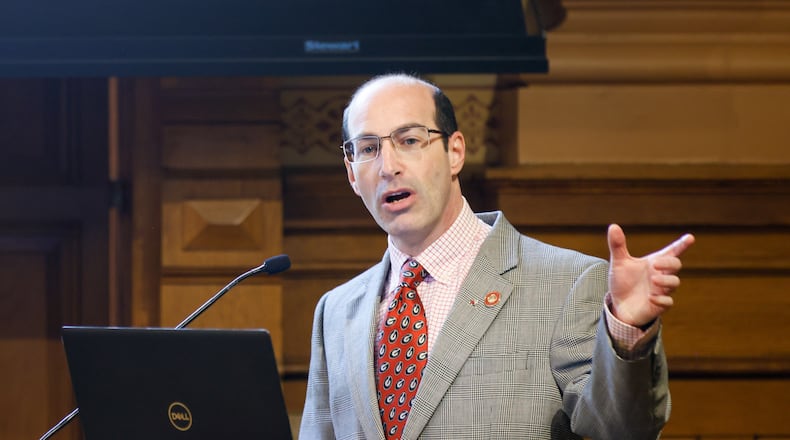Last year’s drop in the stock market is about to have a huge impact on state finances.
State fiscal economist Jeffrey Dorfman of the University of Georgia told state lawmakers Tuesday that the jolt will be coming soon as Georgians file their income tax returns. The state, he said, could see a $3 billion drop from last year in revenue from capital gains taxes because of the 2022 market decline.
“We know we are going to get a big shock when those tax returns come in,” he said.
The state is coming off a record $6.6 billion surplus in fiscal 2022, which was aided significantly by big collections on capital gains taxes due to a booming market the previous year. Taxes were paid in fiscal 2022 based on 2021 earnings, and the S&P 500 index returned 26.61% in 2021.
By contrast, last year it was down almost 20%.
That and slower corporate income taxes from earnings will mean a decline in collections for fiscal 2023, which ends June 30, and a much smaller surplus, Dorfman said.
For the first half of fiscal 2023, collections are up 6.5%, or $966.7 million, over the same period the previous year. But the economist said those gains won’t hold when Georgians start filing their income tax returns in the next few months.
All that is important because the tax collections allow the state to help fund K-12 schools and universities, provide health care to more than 2 million people, patrol and build roads, and train workers.
Credit: arvin.temkar@ajc.com
Credit: arvin.temkar@ajc.com
Legislators on Tuesday began a week of hearings on Gov. Brian Kemp’s $32.5 billion budget proposal that includes $2,000 raises for more than 200,000 teachers and state and university employees, plus big increases for education and health programs.
Kemp spoke to the House and Senate budget committees remotely Tuesday from Davos, Switzerland, where he was speaking at the World Economic Forum.
He told lawmakers his budget plan “puts money where the needs are the greatest.”
While Dorfman presented some bad news on state revenue, much of the economic news was good. Georgia continues to have low unemployment, and 167,000 jobs have been added since the COVID-19 pandemic hit in 2020, he said. Even in areas where there are layoffs — such as information technology — those workers are being snapped up by other businesses, he said.
Georgians have larger savings since the start of the pandemic but are also continuing to spend money, he said, something that has led to big increases in sales tax collections the past few years.
“So far, consumers are not running out of money” he said, adding that while people are increasing their credit card debt, payment delinquency rates are low.
With several new big jobs projects being announced in the past few years — including two electric-vehicle manufacturing plants — Kemp last week said the state must play a role in making sure those employees can find housing.
The state also needs to find workers to fill those jobs. Dorfman noted that the state’s population is not growing like it did during the 1980s and 1990s, and Georgia is having to compete with other other Southern states for people moving from the North.
House and Senate leaders added new features to this year’s budget hearings, including discussions on state liabilities, auditing and federal COVID-19 relief funding, which Kemp decides how to spend.
For instance, Caylee Noggle, head of the Department of Community Health, said because of rising costs the health insurance program for 650,000 teachers, university and state employees, retirees and their dependents could run huge deficits the next two years. That helps explain why Kemp has recommended more than $1 billion be spent to prop up the State Health Benefit Plan.
Greg Griffin, the state auditor, told lawmakers nearly all the audits of 10 special-interest tax breaks requested by the House and Senate tax committees are completed. In answering a question from a lawmaker, Matt Taylor, deputy director of the agency, said all of them so far show they cost the state more money than they bring in.
The Georgia Senate in particular has been critical of special-interest tax breaks and been eager to do away with some of them or cut them back. State Sen. John Albers, R-Roswell, for years championed legislation to measure the effectiveness of tax breaks, which lobbyists frequently push for certain industries with the promise that they will create jobs.
Cutting back on tax breaks is also seen as a way to finance a continued lowering of the state income tax rate. Lawmakers voted to reduce the income tax rate last year and some senators want to eliminate it altogether.
About the Author
Keep Reading
The Latest
Featured





